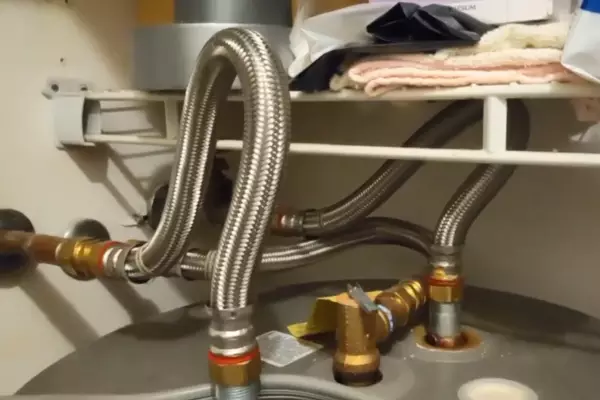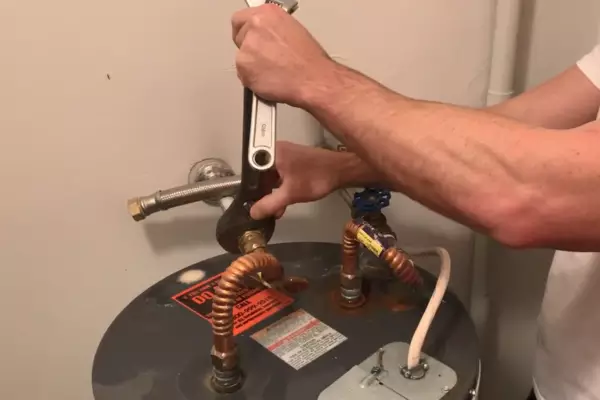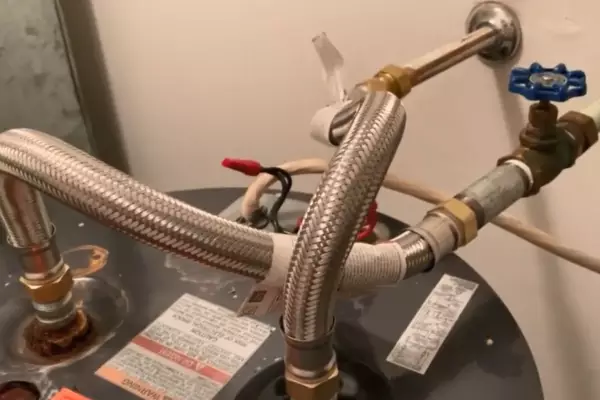The intricate world of home repair often leads us down unexpected paths. Today’s focal point is flexible pipes. A common question among homeowners revolves around their use in a specific context – water heaters.
Flexible pipes offer a distinct set of advantages. Their pliability, ease of installation, and cost-effectiveness make them an attractive option for many applications, including water heaters.
Yet, as with any aspect of home improvement, it’s crucial to assess the full picture. To understand if flexible pipes are suitable for water heaters, one must examine the specifics of both these components.
Contents
Water Heater Basics
Let’s explore the world of water heaters. These essential household appliances function on some basic principles and components.
Components of a Water Heater
Every water heater, regardless of its type, features essential components that enable it to function optimally. These include the tank, heat source, thermostat, drain valve, and piping.
The piping, our primary focus, connects the heater to the water supply and distribution system. It’s crucial for the efficient functioning of the heater.

Role of Piping in Water Heaters
Pipes play an indispensable role in water heaters. They’re responsible for carrying cold water into the heater and hot water out of it. Therefore, choosing the right pipe material is paramount to ensure smooth operation.
Pros of Using Flexible Pipes
The use of flexible pipes in home plumbing, particularly in water heaters, comes with a set of appealing benefits. Let’s delve deeper into these advantages and understand why flexible pipes are becoming an increasingly popular choice.
Easy Installation Process
The defining feature of flexible pipes is their adaptability. This key trait translates into several practical benefits:
- Installation ease: Unlike rigid pipes, flexible pipes can be maneuvered around corners and obstructions with relative ease. This pliability eliminates the need for numerous connectors and fittings that rigid pipes often require, significantly simplifying the installation process.
- Space optimization: Given their ability to bend and curve, flexible pipes are particularly useful in tight spaces or unconventional layouts where rigid pipes might not fit.
- Reduced labor time: Since the installation of flexible pipes is less complex and more straightforward, the time required for their installation is often less than that needed for rigid pipes. This shortened labor time can translate into lower installation costs.
High Durability Factor
Contrary to what their name might suggest, flexible pipes are not fragile. In fact, they exhibit a remarkable resistance to common issues that plague household plumbing:
- Corrosion resistance: Many flexible pipe materials, such as stainless steel and certain types of plastic, are resistant to corrosion. This attribute extends their lifespan, especially when compared to some types of rigid pipes that are more prone to corrosion, like iron.
- Burst resistance: Flexible pipes can handle a wide range of pressures, making them less likely to burst under typical household water pressures.
- Freeze and thaw resistance: Some flexible pipe materials can expand and contract with temperature changes, providing resistance to damage from freezing and thawing cycles.
Cost-effectiveness
The financial appeal of flexible pipes goes beyond the upfront purchase price. Their cost benefits can be seen across various stages of their life cycle:
- Lower installation costs: As previously mentioned, the ease and speed of installing flexible pipes can lead to reduced labor costs.
- Less need for fittings: The pliability of these pipes reduces the need for various connectors and fittings, potentially saving on material costs.
- Extended lifespan: The durability factors mentioned above mean that flexible pipes might need to be replaced less frequently, leading to savings in the long run.

Cons of Using Flexible Pipes
While the benefits of flexible pipes are noteworthy, it’s also essential to discuss potential drawbacks. These pipes are not without their limitations, and understanding these will help you make an informed decision.
Limited Heat Resistance
The heat resistance of flexible pipes can vary greatly depending on the material:
- Plastic pipes: While some types of plastic pipes can handle hot water, others may soften or become deformed at high temperatures. It’s crucial to check the maximum temperature rating for any plastic pipe intended for use with a water heater.
- Metal pipes: Flexible metal pipes, such as those made from stainless steel or copper, typically have high heat resistance. However, they can also conduct heat, which could potentially cause burns if touched when hot water is flowing through them.
Potential for Water Contamination
The risk of water contamination is another aspect to consider:
- Plastic pipes: Certain types of plastic flexible pipes can leach chemicals into the water, especially when the water is hot. These chemicals can affect the taste and safety of the water.
- Metal pipes: While metal pipes generally do not leach chemicals, corrosion or rust can sometimes cause water discoloration and metallic taste.
Structural Issues Over Time
Finally, over time, flexible pipes can face some structural issues:
- Wear and tear: While these pipes are generally quite durable, continuous bending and movement can lead to wear and tear over time.
- Degradation: Some types of flexible pipes can degrade over time, especially when exposed to sunlight or certain chemicals.
- Improper installation: While flexible pipes are easier to install, incorrect installation can lead to sagging, which can cause water to pool in certain sections of the pipe, potentially leading to premature degradation and failure.
Types of Flexible Pipes
There are several types of flexible pipes used in plumbing, each with its unique characteristics.
Stainless Steel Flex Pipes
Stainless steel flex pipes are durable, heat-resistant, and won’t contaminate your water. They’re a popular choice for water heaters.
PEX Flex Pipes
PEX pipes are highly flexible and durable. However, they’re less heat-resistant than stainless steel and could potentially affect water quality.
Copper Flex Pipes
Copper flex pipes combine flexibility with high heat resistance. They’re an excellent choice for water heaters but can be a bit pricey.

Regulations and Standards
Before deciding on the type of pipe, it’s essential to understand relevant regulations and standards.
Local Building Codes
Building codes vary by region. Always ensure that your selected pipe material is approved for use in water heaters as per local codes.
Water Heater Manufacturer Guidelines
Always refer to the manufacturer’s guidelines. These instructions provide specific recommendations for piping and other installation details.
Expert Opinions on Flex Pipes
To gain a more nuanced understanding, let’s turn to the experts.
Plumber Perspectives
Most professional plumbers vouch for the use of flexible pipes, particularly stainless steel or copper, for water heaters. However, they emphasize proper installation and regular maintenance.
Homeowner Experiences
Many homeowners who’ve opted for flexible pipes appreciate their cost-effectiveness and ease of installation. Yet, some have faced issues related to heat resistance and pipe degradation.
Flex Pipe Maintenance Tips
To ensure long-lasting service from your flexible pipes, follow these tips.
Regular Inspection
A routine inspection helps detect any signs of damage early, preventing major issues down the line.
Proper Installation Practices
Proper installation plays a significant role in preventing leaks and prolonging the lifespan of flexible pipes. It’s usually best to hire a professional plumber for the job.
Alternatives to Flexible Pipes
If you’re still uncertain about using flexible pipes for your water heater, consider these alternatives.
Rigid Copper Piping
Rigid copper pipes are highly resistant to heat and corrosion, making them a suitable choice for water heaters. However, they’re less flexible and more expensive.
CPVC Pipes
CPVC pipes are plastic pipes that can withstand high temperatures. They’re relatively easy to install but lack the durability of metal pipes.
Frequently Asked Questions
Are flexible pipes safe for drinking water?
Most flexible pipes, like stainless steel and copper, are safe for drinking water. However, some plastic pipes may leach chemicals into hot water. Always check the pipe’s safety standards.
Do flexible pipes need regular replacement?
While flexible pipes are durable, they may degrade over time. Regular inspections will help determine when replacement is necessary.
Can I install flexible pipes myself?
While you can technically install flexible pipes yourself, it’s recommended to hire a professional. Improper installation can lead to leaks and other issues.
Conclusion
The question of whether to use flexible pipes for water heaters doesn’t have a one-size-fits-all answer. It depends on numerous factors, including the specific type of flexible pipe, local regulations, and personal preferences.
The highlighted pros and cons of flexible pipes can guide your decision-making process. While their easy installation and cost-effectiveness are appealing, factors like heat resistance and potential water contamination cannot be overlooked.
Ultimately, the choice of piping for your water heater should align with your priorities. And regardless of the type of pipe chosen, proper installation and regular maintenance are crucial to ensure the longevity and efficiency of your water heater system.

